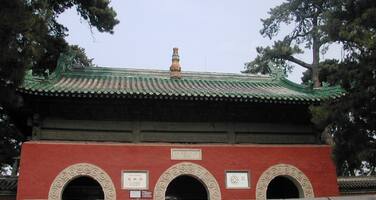Mountain Resort and its Outlying Temples, Chengde
Factors affecting the property in 1996*
- Air pollution
- Housing
- Management systems/ management plan
- Other Threats:
Many buildings in a bad state of conservation
International Assistance: requests for the property until 1996
Total amount approved : 34,150 USD
| 1995 | Training Course in the Mountain Resort and its Outlying ... (Approved) | |
| 1995 | Purchase of additional security equipment for Chengde ... (Approved) | 34,150 USD |
Missions to the property until 1996**
September 1996: UNESCO expert mission
Conservation issues presented to the World Heritage Committee in 1996
A UNESCO mission, undertaken in September 1996, noted that two ten-year plans of conservation were carried out after the Cultural Revolution, with remarkable achievements in the restoration of numerous buildings of the Mountain Resort surroundings and of the denuded mountain landscape. Due to the sheer size (6000 ha), diversity and complexity of this World Heritage site, major additional investments are needed to restore the site. Many buildings remain in a bad state of conservation and visitor management could be further upgraded.
Some of the religious properties which belong to minorities from Mongolia and Tibet are included in the World Heritage site. Some of them were restored recently at considerable cost. Fifty-five Buddhist monks from the autonomous region of Mongolia were allowed to return to the Puning Temple Complex in 1986.
A major issue for the future is to bring development plans for the town of Chengde in line with World Heritage conservation needs, particularly to improve buffer zone protection. Considerable efforts are still required to improve the visual qualities of the site and to reduce air pollution.
Analysis and Conclusion by World Heritage Centre and the Advisory Bodies in 1996
The Bureau may wish to adopt the following text and transmit it to the Committee for noting:
"The Bureau takes note of the report provided by the Secretariat and requests the authorities of China to inform the Committee of the management and conservation and restoration programme for this site, particularly regarding the development of the town of Chengde."
Summary of the interventions
Decisions adopted by the Committee in 1996
20 COM VII.D.61/62
SOC noted by Committee: The Mountain Resort and its Outlying Temples, Chengde (People's Republic of China)
VII.61 The Mountain Resort and its Outlying Temples, Chengde (People's Republic of China)
The Secretariat informed the Bureau at its twentieth extraordinary session that a UNESCO mission visited the Mountain Resort and its Outlying Temples, in Chengde and noted remarkable achievements in the restoration of several of its buildings and of the landscape.
Major issues for the future are to bring development plans for the town of Chengde in line with World Heritage conservation needs, the improvement of buffer zone protection and the reduction of air pollution.
The Representative of ICOMOS stated that even at the time of the inscription of this site, the Chinese authorities had expressed concern over the development of the town of Chengde and how to control its impact on the site.
The Bureau took note of the report provided by the Secretariat and requested the authorities of China to inform the Committee of the management and conservation and restoration programme for this site, particularly regarding the development of the town of Chengde.
* :
The threats indicated are listed in alphabetical order; their order does not constitute a classification according to the importance of their impact on the property.
Furthermore, they are presented irrespective of the type of threat faced by the property, i.e. with specific and proven imminent danger (“ascertained danger”) or with threats which could have deleterious effects on the property’s Outstanding Universal Value (“potential danger”).
** : All mission reports are not always available electronically.


